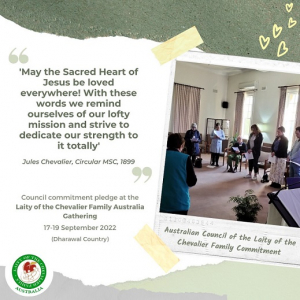Peter MALONE
Pale Horse, The/ 2010
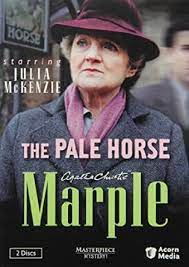
THE PALE HORSE
UK, 2010, 90 minutes, Colour.
Julia McKenzie, Nicholas Parsons, Noel Pearson, JJ Feild, Lynda Baron, Elizabeth Ryder, Jonathan Cake, Nigel Planer, Jenny Galloway, Susan Lynch, Pauline Collins, Tom Ward, Sarah Alexander, Holly Valence, Amy Manson.
Directed by Andy Hay.
The Pale Horse was a popular Agatha Christie story from the early 1960s, reviewers commenting that it was in the spirit of the Dennis Wheatley novels, popular at the time, with tones of the supernatural. But, it was not a story of Miss Marple. Rather, the central character was historian Mark Easterbrook, along with the police inspector, Lejeune.
There had been a television film in 1996 keeping close enough to the novel. This film is also close but a number of characters omitted and the name of the villain change from Zachary to Paul! The main characters, along with Miss Marple, still remain.
Interestingly, the first victim of a murder is a Catholic priest, Father Gorman, played by comedian and writer Nicholas Parsons. He visits a dying woman, makes a list of names that she gives him, posts the names to Miss Marple and is mugged in the street. When Miss Marple receives his letter and hears of Father Gorman’s death, she immediately becomes involved, gives a statement to Lejeune (Neil Pearson), but begins her own investigation, especially with the indication of a hotel in a remote village, The Pale Horse (and its reference to evil, death on the pale horse, revelation 6:8).
There is quite a range of characters, especially the three women who run The Pale Horse (including Pauline Collins and Susan Lynch) who, it is revealed, run some witchcraft experiences. There is also a disbarred lawyer (Bill Paterson) who arranges shady contracts for murder under the guise of betting whether the intended target will live on not. There is also a most suspicious character, with polio and in a wheelchair, Mr Venables (Nigel Planer) whom everybody dislikes and is an immediate target of suspicion.
A neighbour of the dead woman is very friendly towards Miss Marple, telling her of his glimpsing a man with a scar on to his eye standing on the corner at the time of the murder of Father Gorman. He is young, enthusiastic, played by JJ Feild.
Miss Marple does a great deal of investigation, collaborates with Lejeune, perfectly sensible policeman compared with some others in Miss Marple stories, and there is a gathering of all the characters and a revelation – certainly not what most audiences would be expecting!
There was a television version for the BBC, written by Sarah Phelps who adapted several Agatha Christie stories, including the extraordinary ABC Murders where Poirot is revealed as having been a priest in Belgium. Audiences unfamiliar with Agatha Christie might enjoy these versions, including The Pale Horse which veers a lot from Agatha Christie – fans of Agatha Christie and some critics have not been quite so forgiving.
- The popularity of Agatha Christie films? Miss Marple? The three actresses?
- The original novel not a Miss Marple story? The connection with Father Gorman, the letter, her investigations, detective work, visits, The Pale Horse, collaboration with Lejeune, with Mark, with Ginger? The encounters with Paul Osborne? The unmasking?
- The opening, Father Gorman, the Catholic connection, visiting the dying woman, comments about confessing for Romans, jotting down the names, posting them to Miss Marple, his death?
- Miss Marple, and receiving the letter, the list of names, going to visit the home of the dead woman, contacting Lejeune, phoning the home of the dead woman, the information about The Pale Horse, going to the village, the preparations for the Burning, Mrs Gray, her manner, Bella the maid, Sybil and the information? The encounters with Mr Venables, unpleasant? The immediate target of suspicion? Paul Osborne’s information about the witness, the man with the scar? Mr Venables and polio? The captain, his wife, the housekeeper, all staying at the hotel?
- Ginger Corrigan, the funeral, the stepmother, the note with the address for Bradley? Giving it to Miss Marple? Miss Marple and Mark and their visits to Bradley, his smooth manner, disbarred lawyer, the agency for murders? The unknown administrator of the agency? The employees going to scout out houses testing products? The betting, the money to Bradley, the money to Mrs Gray after the ritual?
- Mrs Gray and company, overtones of witchcraft, her manner, threats, sinister, the elaborate performance?
- Paul Osborne, meeting Miss Marple, the information about the witness, young, friendly, Miss Marple inviting him to the village, to identify Mr Venables? His eager collaboration? Miss Marple and her theory about the products, being poisoned, the captain and the lotion for the dog, his death? The other deaths, loss of hair, Miss Marple and their hair in her brush? Taking Paul Osborne to watch Mr Venables, his standing and closing the curtains?
- The setup, Miss Marple working with Lejeune, assembling everyone, the gradual revelations, Mark and his deception with Ginger, Mrs Gray and her allies, the truth about the captain and his relationship, Miss Marple denouncing Paul Osborne, his aggression, his being tricked, his vanity? The arrest?
- The happy romantic ending, Mark and Ginger and Miss Marple happily going on her way?
Last Runway, The/ Leal, solo hay una forma de vivir
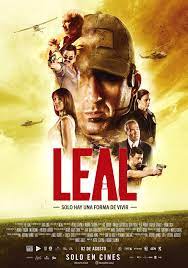
THE LAST RUNWAY / Leal, solo hay una forma de vivir
Paraguay, 2018, 105 minutes, Colour.
Felix Alberto Medina Ortiz, Luis Aguirre, Bruno Sosa Bofnger, Andrea Quattrochi.
Directed by Rodrigo Saloon,Pietro Scappini.
It is unusual to see a film from Paraguay, and this was the first on Netflix.
It is based on actual events – familiar events from most of the Latin American countries, especially those of Central America and drug deals, the cartels, Colombia. Paraguay is a small country, bordering Brazil, but with its own problems.
The film has familiar material but interesting nonetheless. It illustrates the callousness of the cartel leaders, betrayals, murders. It also illustrates how local farmers, with marijuana crops, collaborate with the cartels and provide landing strips for deliveries.
The focus of the film is on a retired colonel being appointed to head the government squad combating drug deals, the leader, the variety of men, their experience, building up camaraderie, training and skill. Just before the final raid, there is a long sequence where they talk and share stories. Then, at the end, the final action is rather quick, codes broken, detailing which airstrip is being used, converging on the plane and the cars, shootout…
There is a touch of romance as well. However, the film is quite a tough one, paralleling the many films coming, especially from Latin America, about combating drug dealing on the cartels.
- A rare film from Paraguay? Atmosphere in Latin America, society, the police, drugs and cartels, networks? The special force, qualifications, planning, intelligence, execution of the plan?
- The atmosphere of Paraguay, cities, towns, farms, marijuana crops, airstrips, homes, official offices? The musical score?
- The tone, the opening, the man and his devotion to his daughter, taken, interrogated, giving information about leaks, promises about his daughter, his being shot? The atmosphere of the cartel boss, smiling and treacherous? Dante, his lieutenant, brutal? The other thugs? The introduction to the farmer, his wife, his son’s decision to go with him rather than study, the trap, their being shot?
- Ibanez, his background, involvement, missions, failures and success? The colonel in retirement, his wife’s concern about him? His being summoned, reinstated as the head of the drug investigation team? His plan, recruitment, the variety of men and their skills, Shakes but his steady aim, Gostoriaga, charm, the Russian, Chamorro, Fanna as the perennial soldier, reinstated? His friendship with the colonel?
- The personalities, camaraderie, getting to know each other, the detailed training, shooting, camouflage…?
- Betty, her place in the team, intelligence, codes, the attraction to Gostoriaga? Working at home, her grandfather and the soccer teams, Brazil? The collaboration, on the names of the players, depositions, techniques?
- The wife of the dead drug dealer, giving the information about the airways? The 10 airstrips? The process of elimination, the plan, the smoke from the marijuana crops? The final information about the landing strip? The success of the mission, her taking over, shooting the cartel boss?
- Fanna going into town, the attack, his being shot? Dante shooting him?
- The setup for the attack, the plan, the group moving in, the tactics for each car, achievement, Gostoriaga wounded, the confrontation with Dante, his being wounded, Kostya not killing him?
- Success of the mission, Betty and Gostoriaga, the achievement – but the widow taking over the landing of the drugs on her airstrips?
15 Minutes of Shame
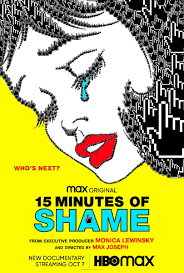
15 MINUTES OF SHAME
US, 2021, 85 minutes, Colour.
Directed by Max Joseph.
An interesting documentary playing on the famous phrase about everyone having their 15 minutes of fame.
This film was produced and directed by investigative filmmaker, Max Joseph, editor of the expose program, Catfish. The film is introduced by Monica Lewinsky, some footage from the past and her relationship with Bill Clinton, the Starr investigation, impeachment, the consequences for her, humiliation – and the consequences even 20 years later.
The film was a combination of case studies, quite emotional in their way, ordinary people who are unknown, but whose lives and behaviour were probed, sometimes quite erroneously, articles written, social media denunciations made, their waking up to find that everyone in the world knew their name. This is quite telling with a focus on the story of the man who in the early months of Covid brought up supplies and sold them online, being investigated by the New York Times, and the publishing of an article condemning him of hoarding and exploitation, a collage of condemnations from social media and mainstream media, including a denunciation of him by Whoopi Goldberg. Another man, with his ordinary job, was driving home through a Black Lives Matter protest, had a habit of drumming his fingers and was photographed, close-up of his fingers, allegedly in a fascist American gesture. Even more close-ups of the finger, spread throughout social media, his being sacked from his job.
Quite a number of interesting cases, involving a woman who voiced an opinion which was taken out of context and multiplied. A young black woman at a university, elected to a position, condemned by a young pro-American blogger, the effect on her life, and her decision to sue him and her winning, his having to pay $700,000.
In the meantime, there are quite a number of talking heads, especially John Ronson who has written on the phenomenon of public shaming. And there are quite a number of experts, especially women, especially black women, all taking up the themes of misogynistic and racist shaming.
And, there are some allusions to Donald Trump.
The public shaming, especially by media, by social media, has become so prevalent in the 21st-century – and this film, along with others of its kind, certainly raise the issues, challenging consciences, especially the temptation to join in and promote the shaming.
Jefa, La/ Under her Control
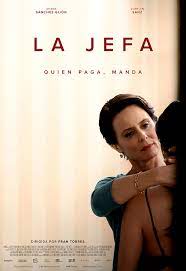
LA JEFA/ UNDER HER CONTROL
Spain, 2022, 109 minutes, Colour.
Aitana Sanchez-Gijon, Cumelen Sanz, Alex Pastrana.
Directed by Fran Torres.
While the Spanish title is clear, with reference to the boss, all the English title is much more ambiguous. The question arises who is the controller and who is controlled?
This is a film about ambition, business, pregnancy, surrogacy.
The initial focus is on Sofia, young Argentinian woman who is ambitious, in a relationship, but presenting herself to the boss of a fashion firm, interviewing well, giving good advice, being employed and promoted. She is played by Argentinian actress, Cumelen Sanz. The sophisticated, self-made, manager of the company Beatriz, is played by Aitana Sanchez Gijon.
When Sofia becomes pregnant, it seems an opportunity for Beatriz to fulfil a longing, to have a child her own. She offers her quite a financial deal to Sofia (who bargains for an even greater amount of money). Sofia will stay in Beatriz’s mansion, secluded, thought to be in London and incommunicado. A lot of attention is given to Sofia’s life in the mansion, the contract drawn up by a lawyer friend, his partner, a doctor, giving her all kind of care.
Time passes, Sofia feel somewhat imprisoned, has hormonal moods. And her boyfriend tries to contact her.
Ultimately, there is a confrontation between the two women, a violent confrontation, the ambitions of the boss completely thwarted – and Sophia walking away
- The title? Relating to Beatriz? To the ambitions of Sofia?
- Spain, the business world, fashion? The ordinary world of work?
- The city settings, apartments, fashionable homes, business offices? The musical score?
- Sofia’s story, age, experience, studies, relationships, with Naccho, yet her ambitions, admiring Beatriz, the interview, her credentials, creating them, making a good impression? Beatriz employing her, her taste, good advice? Promotions? Confidante? Sharing Beatriz’s experiences? The effect on her life, on her relationship with Naccho?
- Beatriz, age and experience, self-made woman, business sense, achievement, her staff, manner of dealing with the staff, peremptory, fashions, taste, impressed by Sofia, employing her, making her something of a companion?
- The workers in the office, advisors to Beatriz, suspicions of Sofia?
- Naccho, ordinary young man, his work, promotions, relationship to Sofia? Hopes?
- The pregnancy, the effect on Sofia, as regards her ambitions? The effect on Beatriz? Her being unable to have children, her friendship with the doctor and lawyer, social, advice? The idea for the pregnancy, the surrogacy, the lawyer and the document, the agreement, Sofia and her hard bargaining about money, the doctor and her promise to supervise the pregnancy?
- The cover of Sofia going to London, the phone cut off, Naccho becoming more desperate, the phone calls? Sofia and the mansion, confined, surveillance, the exercise, the meals, Beatriz and her supervision? The doctor coming?
- The gradual effect on Sofia, some resentment, wanting to contact Naccho, the phone calls? Reacting against Beatriz? And the surveillance? In the room with the cloths?
- Beatriz, sharing the life with Sofia, the luxury, the meals, the swimming pool, supervising the exercise? At work, the reaction of her staff?
- The buildup to the confrontation, Naccho, going to the office, getting the information, driving, the car, his being hit by Beatriz, her concealing the body? Beatriz going to the house, Sofia and her attempts at leaving, the confrontation, Sofia and her bashing Beatriz?
- Beatriz, searching for Naccho, going down the road, imminent birth…?
Rencor Tetuada/ Tatoo of Revenge
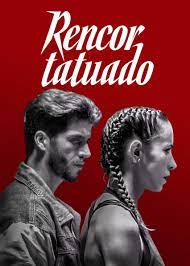
RENCOR TETUADA/TATTOO OF REVENGE
Mexico, 2018, 151 minutes, black-and-white: Colour.
Diana Lein, Irving Peña, Cesar Romero Medrano, Cesar Ramos, Monica del Carmen.
Directed by Julian Hernandez.
Not a film that every audience will want to see. It is a story of Mexico City, 1995, but told in cinema art house style. While there is a core plot, there is quite an elaboration of a range of characters, an investigation, and expose of Mexican authorities and society, the director has not wanted to make a straightforward narrative.
And, with the director, Julian Hernandez, he offers, probably, the main reason why any cinema buff might want to watch the film. For over 20 years he had made dramas observing Mexican society, but, with a particular focus on gay men and gay relationships. (This is not a significant aspect of this film.)
Early in the film, when we see a woman flirting with an elderly man in a restaurant, going with him to an apartment for sex games, then her suggesting bondage but her actually getting revenge on him on behalf of a young maid whom he had brutalised, and tatooing a huge creature on his upper body. The screenplay then intimates that this woman has been doing this kind of thing on several prominent men. It is suggested that the perpetrator is a woman, whose husband was brutalised in a home invasion, who was an expert photographer, but has killed herself.
But, she keeps appearing throughout the film, a range of contacts including a woman who asks her to help, but is setting up a police chief, and she keeps in touch with the vigilante tattooist.
There are also excursions into the underworld of Mexican city life, to the world of Drag Queens, one who wants especially a program on radio that reaches all parts of Latin America.
There is also the film student, journalist, working with the television studio, who is investigating the case, meeting the variety of people linked with the vigilante, obsessed by her, encountering her but only, at the end, recognising who she is.
There are also very bizarre situations, especially with various psychics interpreting situations, going on radio with their commentaries.
And, on the other hand, there are also sequences where sexual behaviour, exotic and explicit, is being filmed (in colour) for wealthy clients.
As the 2 ½ hours pass, often very slowly, the audience has the chance to admire the black-and-white photography and the techniques of the director and his film style and camera work. However, it is only devotees of Julian Hernandez who will persevere to the end, trying to reflect on the core narrative as well as the somatic implications of the narrative, its going into highways and byways.
Ariaferma/ The Inner Cage
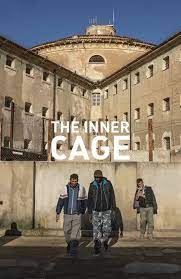
ARIAFERMA/ THE INNER CAGE
Italy, 2021, 117 minutes, Colour.
Toni Servillo, Silvio Orlando, Fabrizio Ferracane, Salvatore Striano, Roberto De Francesco, Pietro Giuliano, Nicolá Sechi.
Directed by Leonardo di Costanzo.
This is an unusual prison film, focusing not on a large prison population but rather a remnant in an old decaying building waiting transfer.
The setting is Sardinia, some graphic black and white/grey vistas of the vast mountains and valleys. But, the focus is on the prison, a large facility now decaying, overviews, abandoned corridors, exercise yard, overgrown gardens, and the central section, a Rotunda where 12 prisoners, a remnant, with six guards, are awaiting transfer.
The audience is introduced to the guards, duck hunting, good friendship, the camp, the fire – and then returning to find that they are not being transferred but have to remain with the last prisoners. The senior guard, Gaetano, played by one of the pillars of Italian cinema, Toni Servillo, giving yet another superior performance, is in charge. He is a man of integrity. He is a man of the letter of the law and strict interpretation. In charge, his men are loyal to him, obedient, although a close friend is particularly critical, spurning the prisoners.
We also see the range of prisoners, 12, an old man with dementia, a paedophile, a bigot against Muslims and Gypsies, a range of ages, a black prisoner, Muslim prisoner, and the youngest, from foster homes, arrested for mugging and brutal beating of an old man while stealing his wallet. The 12 men adapt to the change of situation although ready to revolt, especially refusing to eat the meals brought in from outside caterers. They have exercised time in the yard. Some are friendly. The prisoner who is obviously superior to the others is Lagioia, played by another veteran of Italian cinema, Silvio Orlando.
Gaetano has many elements of humanity but abides by regulations. However, given the strange situation of the men altogether, prisoners in prison, guards in prison, so to speak, he makes some concessions, especially with permitting Lagioia to act as cook. He is able to get the prisoners through their remaining days, especially during a storm and power failure where he allows the men to come out of their cells for the meal, bring all the cell tables together, sit together enjoying a meal, the joy of inviting the guards to sit and share the meal with them. It highlights the possibilities with some common humanity, not denying justice, but discovering some kind of compassion even though Gaetano firmly tells Lagioia that they have nothing in common.
The film gives the opportunity to look at prison systems, overcrowding, treatment of prisoners, but also highlights issues of responsibility, humanity, justice, difficult decision-making.
- Title? Prison? Prisoners and guards? Mutual imprisonment? Inner strengths?
- The setting, the vistas of the mountains of Sardinia, black-and-white, grey photography? The prison, vastness, overview, corridors, yards, gardens, the Rotunda, the guards’ quarters, the men’s cells? The musical score, the chant?
- The situation of the prison, the prison and its physical collapse, the director, the orders, moving most of the prisoners, the remaining 12, the guards to remain? The uncertainty of the final date for moving?
- The introduction to the guards, hunting, camping, duck hunting, chatter, friendship? Their being called to the director, the new orders?
- Gaetano, in charge, age, experience, manner, the rules, justice, treatment of the men, of the prisoners? The personal scenes in his room? Interaction with his men, the different points of view? Discipline, supervision, the issue of the hunger strike, rejecting the meals? Lagioia and his offer to cook, accepting this, supervising him in the kitchen?
- Fantacini, the youngest, serving the meals, the story of his being in foster care, the attack on the old man, stealing the wallet, brutalising him, the news of his being in coma, the lawyer coming to see him, the future trial, the heavier sentence if the man dies? His helping with the cooking, awkward, talking with Lagioia, Lagioia reassuring him, in his cell? Gaetano and his treatment of fettuccine?
- The range of men, age, backgrounds, race, Islam, the bigoted prisoner and his continued attacks, against Gypsies? His eating his meals alone? His later criticism of arts are no, paedophile, not eating with him? The black prisoner, chosen to share the cell with Fantacini and stop him from self-harm? Alexander, the old man, memory loss, pretending or not, exercise alone, the meals, finally coming out, sitting with the others? The bigot and his condemnation, that he would not change?
- The joy, the success of the meals, the response of the men? The critical officer, condemnatory of the men, not wanting to eat their meals?
- The deliveries late, Gaetano and Lagioia going out into the garden, collecting the herbs and vegetables, the discussions about their background, the joy and his father, the indicating that the Lagi family used the Gaetano fathere with their dairy suppliers?
- Fantacini, the lawyer, his news, in the cell, his being brought back, against the regulations?
- The blackout, the generator not being able to be restored, the opening of the meal, the limited lights, bringing out the tables from the cells, putting them together, the men eating their meal together, the invitation for the guards to sit, Gaetano, the bottle of wine, the talk, friendship, bonding?
- Gaetano, the issue of humanity, discussion with Lagioia, Gaetano saying they had nothing in common?
- The lights coming on, everything back to normal, the men in their cells, checking out the names?
- The consequences for the prisons, the guards, the Gaetano, and the possibilities for the men to be transferred?
Nuit de 12th, La/ The Night of the 12th
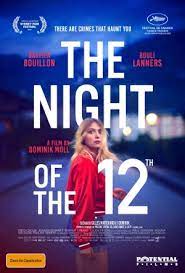
LA NUIT DE 12TH/THE NIGHT OF THE 12TH
France, 2022, 115 minutes, Colour.
Bastien Bouillon, Bouli Lanners.
Directed by Dominik Moll.
Most audiences enjoy crime investigation stories. This one is very well told. However, while it is based on actual events, it is a sympathetic point of view of police and detectives working on cases, unsolved cases and finding the frustration in not being able to solve them. As well as the personal involvement with some of the victims of crime, their families, and interrogating suspects.
This film has the advantage of attractive settings, from the police precinct in Grenoble to villages out in the country, some majestic scenes of the Alpine terrain.
The audience is invited into the action with two openings: a squad celebrating the retirement of its esteemed chief and the transition to a new commander; a 21-year-old leaving her friend’s house in a completely masked stranger, the throwing of lighter fluid, the lighter, torched, the girl’s death.
The work of the new commander (Bastien,Bouillon) is highlighted and intertwined with the audience’s increasing knowledge about the murdered girl, her character and background, all being exposed. The commander offers to break the tragic news to the parents but his eyes caught by a photo portrait of the murdered girl on the wall, with her pet cat, and he goes blank, very much affected. And this drives him through the investigation.
In many ways, the screenplay is a painstaking development of the investigation, the various interviews, the parents, the best friend (who does want to protect her friend’s reputation and is slow in forthcoming with possible suspects), workplace contacts…
And the screenplay continues to fascinate the audience with a succession of possible suspects, former boyfriends, a hostile rap-song composer who is asked to sing his song which has direct reference to the manner of the girl’s death, a local bystander who sends the cigarette lighter to the police, a man charged with violence against his former wife but who is protected by his girlfriend’s testimony in his favour. We realise that each of these men could be the killer – or not.
And this takes its toll on Yohan, sometimes morose, often angry, taciturn, releasing his pent-up energies by fast cycling in a velodrome. He does work well with his men though is critical of some of their stances torched criminals. But, the significant other character is the middle-aged Marceau (played by veteran Belgian actor Bouli Lanners), wanting to have a child with his wife whom he loves but who now wants a divorce because she is pregnant from a new liaison. There is a powerful sequence where he gets into Yohan’s car and just tells him the story, then leaves. Later Marceau will be so frustrated that he will hurry to interview one of the suspects, becoming physically violent with him.
Three years pass, a judge becomes interested in the case, summoning Yohan who now has a new team, especially having a female detective as part of the team, reflecting that this kind of crime is perpetrated by men against women, and is chiefly investigated by men. She indicates hope-for changing attitudes.
On the anniversary of Clara’s death, there is surveillance, and some dramatic moments.
So, the audience is invited to share the life and work of the detectives, the details of their work, interviews, reports, speculation, and the frustrations that continually hinder the completion of their work.
- The popularity of crime investigation dramas? Police squads? Specialists? Detective work?
- Comment on unsolved cases, the impact on detectives, frustration, emotional involvement?
- The locations, Grenoble, the Alps, mountain scenery, the country towns, homes, police precincts? The musical score?
- The opening, Clara, leaving the house, sending the video, the masked attacker, the fuel, lighting it, burning, the death?
- The evening of celebration, the police chief retirement, the speeches, camaraderie, banter, Yohan taking over?
- The call to the crime scene, the local police and their reactions, some resentments? The calling of the squad from Grenoble? The site, photos, evidence? The phone?
- The main part of the film as the process for detection? The visit to the parents, the mother breaking down hysterically? The Father’s response? Many arriving? The shock of the news? The interviews?
- The gathering information about Clara, personal and intimate details, her behaviour, attitudes, reputation? Nanie defending it?
- The range of men, many gradually giving information, forgetting? Tracking the men down? Wesley, at the resort, his assessment of Clara, the sexual relationship, his girlfriend? Breaking? The news about the rap singer, his calling in, the lyrics of his song, against Clara, torching her? Dennis and sending the lighter, tracked down, poor reputation, his alibi, explanations? The information about Vincent:, brutal, charges against him, his girlfriend, bravado, her defending him, alibis? Later hearing his brutal phone call to his girlfriend? The possibility for each of them to being the killer?
- The commentary of vulnerability of women, that it was men who killed women?
- Yohan, cycling in the velodrome, intensity, taking over command, not talkative, his relationship with the other men, teamwork? The friendship with Marceau? Yohan not having any private life, his apartment, the cycling? Yet angry?
- Marceau, his years of experience, frustrations, wanting to teach French, his wife, love for her, pregnant, yet wanting the divorce, the three months relationship, the other man and the pregnancy? Getting in the car and telling Yohan the story? His investigations, interviews, listening to Caroline’s phone call, driving, the physical assault? His leaving, reassigned? Later sending the photo of the blue flower to Yohan?
- The reports, the broken photocopier, frustrations? The meetings between the team, the jokes, the work, interviews? Personal attitudes, especially towards criminals?
- No solution to the case? Three years passing? The introduction to the judge, her interest in the case, summoning Yohan, the anniversary, the suggestions about surveillance? The new team, new recruit, top of her class, her choices for investigation, shrewd assessment, of Yohan?
- The judge supplying the finances, the van, the death site, the parents coming with their candles? Going to the cemetery, the camera, the discovery of the individual, his behaviour, relying on the grave, singing the song? No sound? The hearing-impaired interpreter, the song and the research discovering it? Possible solution? The fact of his being interned in the mental institution, not the killer?
- Marceau sending the photo, Yohan photocopying it, sending the message to Marceau in wishing him well, and his cycling up the mountainside, branching out?
- The audience sharing the frustration of not being able to solve the case, the experiences of police and detectives with case unsolved, and personal commitment to the cases?
Power of Rome
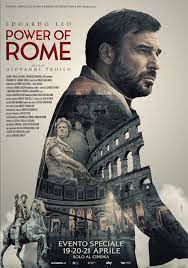
POWER OF ROME
Italy, 2022, 83 minutes, Colour.
Eduardo Leo.
Directed by Giovanni Troilo.
The Power of Rome has been well known and acclaimed for more than 2500 years. The power has been political. The power has been ecclesiastical.
Here is an 80 minutes opportunity for the audience to reflect on this history, this power, the exercise of power and its consequences, some of the key personalities involved, some of the significant buildings still standing in the city.
Response to this film will depend on audience knowledge about Rome and its history, knowledge from history books, from the movies, rather than actually having visited the city. For those who have visited the city, for those who have lived there, it is an opportunity for reflection and rumination, wondering why this person, this event, this building was highlighted rather than others.
And this invitation to reflect comes from the style of the film, not a straightforward documentary. Rather, it is a variation on the docudrama. And the framework, and constant reference, is to making movies about Rome – and this particular case, an opening on the ides of March with the conspirators and Brutus about to stab Caesar and the actor objecting, halting the scene to the director’s frustration, speculating on what would have happened had season not been killed. Would there have been a Roman Empire? And the role of Augustus?
The actor, Eduardo Leo, takes time off to wander around the city, to observe, to think. And, as he does so, the filmmakers provide some historical re-creations, Marc Anthony reciting his Shakespearean speech about burying Caesar, sequences about Nero, his madness, the influence of his mother, the burning of Rome, the initial conflict between Romulus and Remus, gladiator fights…
And the film spends a lot of time at the Coliseum, giving its history, contemporary guides explaining the history to tourists, the power of bread and circuses for the masses, and the dedication of the Coliseum by Titus. There is also some time spent at the Pantheon and its place in Roman history.
And, there is the role of Christianity, the survival of Christians during several centuries of persecuting attitudes, until the coming of Constantine, his vision of the cross, his shrewd political sense about only one God worshipped in the Empire. And there are some scenes of his mother, Helena, going to Jerusalem in search for relics – and the comment that she raised veneration of the Virgin Mary from a small devotion to a key component of Christianity. And, there is St Peter’s, looking larger, grander than it often does, and the inclusion of some clips of the filming of workers on the dome, quite vertiginous for the viewer!
And, the continual references to the movies, to Ben Hur, to the making of Quo Vadis, to Christopher Plummer in The Fall of the Roman Empire, a visit behind the scenes at Cinecitta, props, long corridors of costumes… – and, as the actor travels around Rome on a motorcycle with the production assistant, references to Audrey Hepburn and Gregory Peck!
No real conclusions (except that the actor goes back and allows Caesar to be stabbed), just verbal and visual stimuli to reflect on Rome and its past power – with no compliments for contemporary Rome. During the final credits, on the left side of the screen, there is a continual running list of significant dates.
Lay MSC weekend, St Mary’s Towers.
Lay MSC weekend, St Mary’s Towers.
News from Fred Stubenrauch. Posters design by Aidan and Clare Johnson

25 attended in person and others were able to be present via video link. The theme was ‘Time to see, time to choose, time to act’ and focussed on Spirituality of the Heart, The Uluru Statement for the Heart and Laudato Si.
On Friday the opening prayer was prepared by Lee and set the atmosphere for our weekend. It was very moving and beautifully presented.

On Saturday we were welcomed to Dharawal Country by Wendy Lotter who provided us with a cleansing smoking ceremony and informed and entertained us with her stories.

Claude Mostowik presented, as we have come to expect, a wonderfully prepared, inspiring paper on the Challenge of the Gospels, through the lens of Laudato Si and the Uluru Statement (Creation as God's Love Story).

We were most fortunate to have a recorded message from Pat Dodson (who was suddenly called to the UN and went to considerable trouble to help us via the generous help of Phil Glendenning from the Edmund Rice Centre) and the message that Yingiya Guyula presented at the Garma festival. Yingiya is MLA for the seat of Mulka in NT.

The film "The Hungry Tide" brought to us the devastating impacts that climate change is having on Kiribati.
Elizabeth Young rsm gave a wonderful presentation on Laudato Si.

Our day was completed with a beautiful reflection by Alison

Sunday, after Mass and morning tea with the parish we were guided on a "Walk on Country" by Narita - an attempt by us to experience something of the way indigenous people are vitally connected to their country.

This was followed, after a sumptuous meal for us by the SMT staff, by the appointment of the new National Council for 2022.
Council
Midnight in the Switchgrass
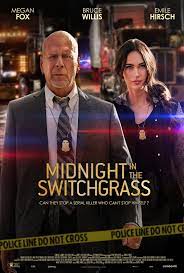
MIDNIGHT IN THE SWITCHGRASS
US, 2021, 99 minutes, Colour.
Emile Hirsch, Megan Fox, Bruce Willis, Lukas Haas.
Directed by Randall Emmett.
For more than a decade Bruce Willis made several action films a year. But, here he is very much part of the supporting cast. The film belongs to Megan Fox and Emile Hirsch.
The film opens with the investigation of the death of a prostitute, identification, the detective, Byron, Emile Hirsch, going to communicate the news to her mother. He is obsessed with previous killings and wants to investigate, but is not supported by his superiors. He encounters two FBI agents, Rebecca and Karl, Megan Fox and Bruce Willis, and collaborates with them in the investigation.
Bruce Willis has only a few sequences, an ageing FBI agent, warning his partner against taking risks. Rebecca is impelled, wants to take risks, sets up dates and encounters, her drink spiked by the serial killer whom the audience has been watching for some time, abducted.
The killer, a truckie, with a loving family, devoted to his daughter, he is played by Lukas Haas (innocent young boy, in Witness, 1985). We see him rescuing a young woman but is, in fact, abducting her. He is obsessed, makes excuses to his family, goes to bars, sets up the meetings, abducts assaults, kills the women.
Byron does some detective work and is able to eventually save the day.
An interesting abduction and detection action drama.
- The title? Evocative? The isolated farmhouse, the fields, the switchgrass, the culmination in the switchgrass?
- Murders, serial killer, background and situations, the visualising of the attacks on murders? The police investigation, the FBI, the special mission for Rebecca? The audience knowing who the killer was, seeing him as a person, his interventions, family life, devotion to his daughter, double life, the bars, the pickups, imprisonment, torture, killings?
- Byron’s story, local police, his investigations, reputation, interactions with his superiors? On the scene of the crimes? Linking the murders? The information, the flashbacks? His marriage and home life? The devotion of his wife? Being away from home? The investigations, the initial dead girl, going to visit her mother, his empathy with the mother, his promise of further news? The encounter with Karl and Rebecca? The FBI? Collaboration?
- Rebecca, seeing her with the client, his behaviour, her behaviour, turning the tables? Her motivation, her past? The investigations, relentless, taking risks? A partnership with Karl, discussions with him, his cautions? Her becoming more involved, following clues, going to the bar, in the bar with Peter, his spiking her drink, the abduction, finding Tracy? Peter and his behaviour, taunts? Her urging Tracy to escape, the consequences, her being left hanging?
- Tracy, at the party, leaving, upset, the truckie attacking her, Peter intervening, her taking the lift, his abducting her, imprisoning her? Blindfold, treatment, sexual and provocative? Rebecca arriving, her spirit low, Rebecca urging her to escape, getting out, in the switchgrass, finding the house, being taken in, saved, the woman not responding to Peter’s threats?
- Peter, initially seeming gallant, abducting Tracy, the scenes with his wife, his absorption with his daughter? Going out, excuses, going to the bars, the pickups, the women, serial killer? Spiking Rebecca’s drink, abducting her? At home, his daughter seeing someone in the switchgrass, Tracy’s escape, his going to the house, the old lady getting him to leave?
- Byron, his continued investigations, getting the information about the truck drivers, their presence and absence, getting the address of Peter, going to the house, the rescue? His going back to the old lady with the news of Peter’s capture?
- Rebecca, the experience, the future? And her work with Karl?
